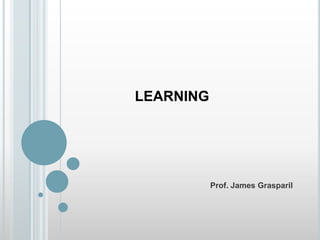
Learning
- 1. LEARNING Prof. James Grasparil
- 3. LEARNING - A RELATIVELY PERMANENT CHANGE IN THE BEHAVIOR THAT OCCURS AS A RESULT OF PRACTICE OR EXPERIENCE.
- 4. ESSENTIAL ASPECT OF THIS DEFINITION •The term learning does not apply to temporary change in the behavior. •It does not refer to changes resulting from maturation or biological influence. •Can result from vicarious as well as from direct experience. •Changes produce by learning is not always positive
- 5. NATURE OF LEARNING •Essential for survival ( Non Scholae Sed Vitae ) •Learning takes place without realizing that we are learning.
- 6. ESSENTIAL ASPECT OF THE LEARNING PROCESS 1. Motivation 2. Goal 3. Readiness 4. Obstacle 5. Responses
- 7. THE EARLIEST THEORY OF LEARNING Plato and Aristotle were called rationalist because they emphasized the role of the mind in acquiring knowledge. Plato- believed in nativism that the knowledge is inherited and is therefore natural or an innate component of the human mind. Aristotle-was called empiricist, since he focused on sensory information as the basis of knowledge.
- 8. LAW OF ASSOCIATION BY ARISTOTLE LAW OF SIMILARITY-RECALL OF SIMILAR OBJECT. LAW OF CONTRAST-RECALL OF OPPOSITE OBJECT. LAW OF CONTIGUITY- RECALL OF AN ACTIVITY WHICH IS FREQUENTLY RELATED WITH THE PREVIOUS ONE.
- 9. ASSOCIATION THEORY -AROSE FROM ARISTOTELIAN POINT OF VIEW -EDWARD LEE THORNDIKE,FORMULATED THE BASIC CONCEPT OF THE MODERN ASSOCIATION THEORY SHORTLY THE 1900,HIS THEORY IS KNOWN AS CONNECTIONISM THEORY OR STIMULUS RESPONSE THEORY. WHY S-R THEORY? -ACCORDING TO THORNDIKE HUMAN ACTIVITY IS BASED ON ASSOCIATION BETWEEN STIMULUS AND RESPONSE.
- 10. PRINCIPLES OF CONNECTIONISM LAW OF READINESS -STATES THAT WHEN A PERSON IS PREPARED TO RESPOND,GIVING THE RESPONSE IS SATISFYING AND BEING PREVENTED FROM DOING SO IS ANNOYING. LAW OF EXERCISE -STATES THAT CONSTANT REPETITION OF RESPONSE STRENGTHENS ITS CONNECTTION WITH THE STIMULUS AND DISUSE OF RESPONSE WEAKENS IT. LAW OF EFFECT -STATES THAT LEARNING IS STRENGHTEN IF THE RESULT LEADS TO SATISFACTION,BUT WEAKENS IF LEAD TO ANNOYANCE.
- 11. CONDITIONING THEORY WHAT IS CONDITIONING?
- 12. CONDITIONING -THE TYPE OF LEARNING INVOLVING STIMULUS-RESPONSE CONNECTIONS,IN WHICH THE RESPONSE IS CONDITIONAL ON THE STIMULUS.
- 13. CLASSICAL CONDITIONING OR RESPONDENT CONDITIONING PROPONENT: IVAN PETROVICH PAVLOV (1849-1936) WHAT IS CLASSICAL CONDITIONING? LEARNING A RESPONSE TO A NEUTRAL STIMULUS WHEN THAT NEUTRAL STIMULUS IS PAIRED WITH A STIMULUS THAT CAUSES A REFLEX RESPONSE.
- 14. VARIABLES OF CALSSICAL CONDITIONING 1.NEUTRAL STIMULUS-AN EXTERNAL STIMULUS THAT DOES NOT ORDINARILY CAUSES A REFLEX RESPOONSE OR AN EMOTIONAL RESPONSE. 2.UNCONDITIONED STIMULUS -ANY STIMULUS THAT CAUSES A REFLEX RESPONSE OR EMOTIONAL RESPONSE WITHOUT THE NECESSITY OF LAERNING AND CONDITIONING.
- 15. 3.UNCONDITIONED RESPONSE -THE REFLEX RESPONSE EVOKE BY STIMULUS WITHOUT THE NECESSITY OF LEARNING. 4.CONDITIONED STIMULUS -A PREVIOUSLY NEUTRAL STIMULUS THAT THROUGH CONDITIONING NOW CAUSES A CLASSICALLY CONDITIONED RESPONSE. 5.CONDITIONED RESPONSE -A LEARENED RESPONSE TO A PREVIOUSLY NEUTRAL STIMULUS THAT HAS BEEN ASSOCIATED WITH THE STIMULUS THROUGH REPEATED PAIRING.
- 16. PRINCIPLES OF CLASSICAL CONDITIONING 1.STIMULUS GENERALIZATION-THIS PROCESS OCCURS WHEN THE CONDITIONED RESPONSE IS NOT ONLY ELICITED BY THE ORIGINAL CONDITIONED STIMULUS,BY ANOTHER STIMULUS SIMILAR TO CONDITIONED STIMULUS. 2.DISCRIMUNATION-GIVING A LEARENED RESPONSE ONLY TO A SINGLE SPECIFIC OBJECT. 3.EXTINCTION-ALSO KNOWN AS UNLEARNING 4.SPONTANEOUS RECOVERY-THE RESPONSE THAT HAD BEEN LEARNED AND THEN EXTINGUISH AND RE APPEARED WITHOUT LEARNING.
- 17. OPERANT CONDITIONING -IS A TYPE OF LEARNING FOR WHICH THE CONSEQUENCE THAT FOLLOW THE BEHAVIOR IS STRENGHTENED OR WEAKENED THROUGH REINFORCEMENT. NO REINFORCEMENT WILL OCCUR UNTIL THE SUBJECT MAKES THE REQUIRED RESPONSE OR OPERATES ON THE ENVIRONMENT. HENCE, THE ORGANISM PLAYS AN ACTIVE ROLE IN THE LEARNING PROCESS.
- 18. REINFORCERMENT-ANY ACTION OR EVENT THAT INCREASES THE PROBABILITY THAT A RESPONSE WILL BE REPEATED. TYPES OF REINFORCEMENT 1. PRIMARY REINFORCEMENT-STIMULI THAT INCREASE THE PROBABILITY OF A RESPONSE AND WHOSE VALUE DOES NOT NEED TO BE LEARNED, SUCH AS FOOD,WATER,SEX. - IT IS INNATELY REINFORCING. 2. SECONDARY REINFORCEMENT-STIMULI THAT INCREASE THE PROBABILITY OF A RESPONSE AND WHOSE REINFORCING PROPERTIES ARE LEARNED, SUCH AS MONEY AND MATERIAL POSSESSIONS. -NOT INNATELY REINFORCING.
- 19. 3. POSITIVE REINFORCER- REINFORCEMENT IN WHICH A STIMULUS IS GIVEN OR ADDED THAT IS DESIRABLE TO THE SUBJECT. 4. NEGATIVE REINFORCEMENT- REINFORCEMENT IN WHICH A PAINFUL OR ANNOYING STIMULUS IS TAKEN AWAY. (IT IS CALLED REINFORCER IF IT CHANGES THE OPERANT RATE OF THE INDIVIDUAL;IF IT IS INEFFECTIVE,IT IS NON-REINFORCER)
- 20. PUNISHMENT-ANY ACTION OR EVENT THAT DECREASE THE LIKEHOOD OF A RESPONSE BEING REPEATED. TYPES OF PUNISHMENT 1. POSITIVE PUNISHMENT-PUNISHMENT IN WHICH AS AVERSIVE OR UNDESIRABLE STIMULI IS APPLIED TO DECREASE A RESPONSE. 2. NEGATIVE PUNISHMENT-PUNISHMENT IN WHICH A DESIRED STIMULUS IS REMOVED TO DECREASE A RESPONSE.
- 21. SIDE EFFECTS OF PUNISHMENT -PUNISHMENT CAN HELP DECREASE UNWANTED BEHAVIOR, BUT IT ALSO HAS SERIOUS SIDE EFFECTS AND SHOULD THEREFORE BE AVOIDED IF POSSIBLE. -MAJOR SIDE EFFECT OF PUNISHMENT IS ITS TENDENCY TO LEAD TO FRUSTRATION IN THE PERSON OR ANIMAL BEING PUNISHED,WHICH CAN LEAD TO ANGER AND EVENTUALLY AGGRESSION.
